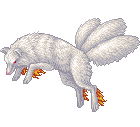Viewing eAgdw

Hardiness: 71
Appearance: 2
Emerged: 2:40 11.10.2021
Matured: 10:03 13.10.2021
The warmth provided by their thick fur makes Klara Alsaltos perfectly adapted for cold environments, and they spend much of the year hunting along the arctic coast. They feed on birds, small mammals, and fish and are most often spotted in their signature pounce stance as they leap up and dive down to catch their prey. Some Klara Alsaltos have been observed with bioluminescent polyps growing on them—research has determined that there is a symbiotic relationship between the two species, with the poisonous Vulpa Brulo offering defense in return for the protection and nutrients provided by the Klara Alsalto. Further investigation is still needed to determine how the symbiote becomes attached to the host. Another unusual feature is that of their multiple tails, with some displaying as many as nine fluffy appendages. The extra tails do not appear to hinder movement and help trap more heat while a Klara Alsalto sleeps in its standard curled position, keeping it warm even in subzero temperatures. Kits are born throughout the year, with one parent staying with the litter to keep them warm while the other hunts.
The creatures that dwell in this rather desolate world still display some diversity in appearance, eating habits, and social behavior. Whether they have fur or feathers, skin or scales, their unique genetic makeup allows for a variety of colors and markings within each species. Despite limitations in food sources, herbivores, omnivores, and carnivores are all present in the food chain, and each species requires specialized care within a laboratory. Although the artificial setting of housing units and breeding pods precludes most opportunities to study true interspecific behavior, the interactions within and between species has been studied extensively in the wilderness by scientists daring enough to venture beyond the outpost’s walls.
